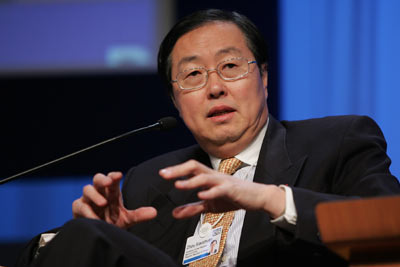Top Banker: China to stick to foreign reserves policy
(Agencies)Updated: 2006-11-10 17:33
Frankfurt -- The governor of the People's Bank of China said Friday that the country has no plans to change its policies toward foreign exchange reserves.
 People's Bank of China Governor Zhou Xiaochuan speaks during the 'China Goes Global' session at the World Economic Forum (WEF) in Davos, Switzerland, January 26, 2006. [Reuters/file Photo]  |
Speaking on the sidelines of a conference hosted by the European Central Bank, Zhou Xiaochuan said, "We stick to the existing policy."
He added that the Chinese central bank had experienced "many years of diversification policy."
Zhou gave no indication of whether China will change the currency composition of its reserve portfolio or shift it across different asset classes.
"We are considering lots of instruments (for diversification)," said Zhou, when asked whether China planned to shift its reserve portfolio away from US.Treasuries and into higher-yielding US corporate debt, as reported by a newspaper this week.
His comments came after the country's currency regulator denied a report by Chinese state television that its export-fueled foreign exchange reserves had surpassed US$1 trillion.
In its last quarterly report on the reserves, the bank said October 13 that the total rose to US$987.9 billion at the end of September. The reserves are growing by about US$20 billion a month.
China's reserves are growing rapidly as the central bank buys up foreign currency in order to contain pressures that might ignite inflation as foreign money floods into the country amid an export boom.
A US Treasury Department spokeswoman declined to comment on Zhou's remarks. China is the second-biggest foreign holder of US Treasuries with US$339.0 billion as of August, according to Treasury Department data.
A shift away from dollar assets by China could put upward pressure on interest rates in the United States which has relied heavily on Asian purchases of its debt to finance its huge current account deficit.
Policymakers have worried this could destabilize financial markets and upset robust global economic growth.
"We have long warned against the diversification wave by global central banks in light of the peak in US interest rates and the need to diversify into other currencies and commodities that are boosted by steadying commodity prices," Ashraf Laidi, chief FX strategist at CMC Markets, said in a note to clients.
China, in order to hold down the yuan, has bought most of the dollars generated by its growing trade surplus -- which hit a record US$23.83 billion in October -- inflows of foreign direct investment and speculative capital.
Beijing has pledged to use its reserves in a responsible manner that will not destabilize global markets. Chinese central bank officials have said it is risky to hold as many dollars as it has now.
Zhou also said it was good that China's currency is moving in line with market supply and demand.
The yuan was revalued by 2.1 percent in July 2005 and cut loose from a dollar peg to float in tightly managed bands, and has gained about 3 percent since then.
Asked if he was satisfied with the yuan's appreciation, Zhou said: "It doesn't matter whether I am satisfied or not. It follows supply and demand (situation) in the market and it's good."
Asked if China was planning any more financial market reforms, he said: "Always."
|
||
|
||
|
|

